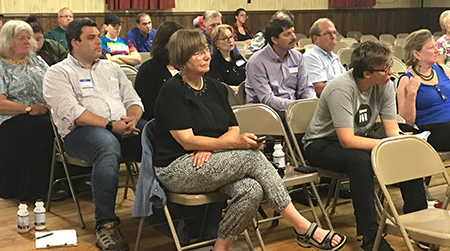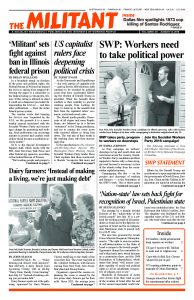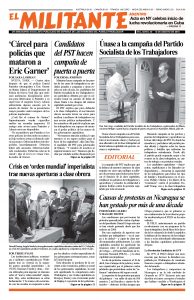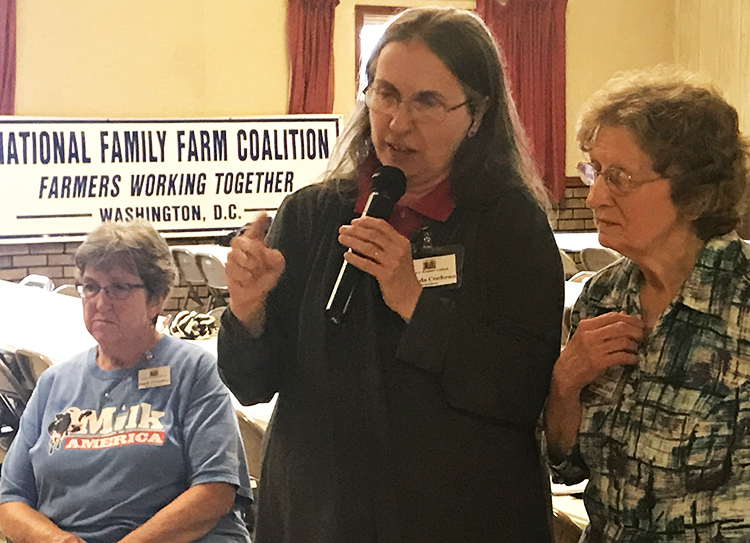LAIRDSVILLE, Pa. — “Dairy farming just doesn’t work anymore,” Ben McCarty, a dairy farmer from Lycoming County, told an all-day “Dairy Farm Family Crisis Hearing” here July 24. “Instead of making a living you just make debt.”
Dairy farmers spoke out at the gathering, sponsored by Farm Women United, testifying to the depth of the crisis they face. The event was held at the volunteer firehouse, with farmers coming from New York, New Jersey, Maryland and Pennsylvania.
Organizers opened the session explaining the crisis is caused by the low prices dairy farmers get for their milk. Since 2015, the average price farmers receive has fallen below $18 per hundred-weight — $1.55 a gallon — while the U.S. Department of Agriculture estimates the cost of production for medium-to-small dairy farms is from $18 to $21 hundredweight. Farmers pointed out they never actually get that “average” price.
Barb Troester, who runs a 700-cow dairy farm with her husband Leroy near Mifflinburg, some 40 miles away, spoke about the deductions the milk co-op takes out of her check. “I added it up and figured that every time the milk truck comes, which is every day, it costs us $1,800 in deductions,” she said. “Our average price comes to just $14.37 per hundredweight. Dairy farmers work hard seven days a week, 365 days a year, yet I am not ashamed to tell you that the bank owns us, they really do.”
Judy Oliver, another Pennsylvania dairy farmer, also held up her milk check, pointing out the long list of deductions the co-op took from her $16.50 hundredweight price.
Demand for guaranteed price floor
The over 50 farmers and others at the hearing endorsed a proposal for an immediate $20 hundredweight floor on the milk price for farmers. “This looks like it might be more than the cost of production, but remember all the deductions they will be taking off your $20,” Arden Tewksbury, director of Progressive Agriculture Organization, told the farmers. “The Federal Milk Marketing Orders that sets the price won’t give us cost of production, but they let the dairy companies and co-ops deduct a cost of production ‘make allowance’ of up to $2 hundredweight — plus all the other deductions they make.”
Tewksbury has been promoting this $20 floor price demand to other farm and dairy farm groups for the last several months.
Dairy cooperatives handle most farmers’ milk. Five of them handle 43 percent nationwide. They are farmer-owned and governed, in theory, but the big ones like Land O’ Lakes and Dairy Farmers of America function like big-business monopolies.
Claudia and Jonathan Haar, dairy farmers from New York state, described the lawsuit they are part of that is challenging the way large co-op bosses ignore the ownership rights of dairy farmers. The basis for the challenge is that for the last three years co-op dairy farmer members’ income has dropped, but the co-ops’ profits have tripled.
Tewksbury reminded participants that the price is still set by Department of Agriculture Federal Milk Marketing Orders, which is supposed to take dairy farmers’ costs into account. “They seem to listen to the big co-ops and dairies like Land O’Lakes, Dean Foods and Walmart to set a price that pleases them,” he said. “I urge you all to call your congressional representative and get them to put the $20 floor in the 2018 Farm Bill. If it passes like it is now, our dairy crisis will get worse.”

The event heard a number of reports covering different aspects of the crisis. Donna Hall, vice president of Farm Women United, explained ways big dairy companies manipulate imports of powdered milk to say there is a “glut of milk.” They use this to drive down what they pay farmers.
Gerald Carlin explained how the big cheese dairies use “milk protein concentrate” from left over milk fat after low-fat milk is produced to double the amount of cheese they get from every hundredweight of milk. “So with less milk being used to make even more cheese, they also say we’ve produced a ‘glut,’” he said.
Other farmers explained how they were hit by changes in the Federal School Lunch Program made under the Barack Obama administration. They stopped offering whole milk in federal school lunch programs, only supporting 1 percent or nonfat milk. Now schools are cutting back on milk orders, Tewksbury and other dairy farmers said, because young people don’t like the low-fat milk.
When all is said and done, farmer Barb Troester said, “We need a fair price.”
Because farmers can’t make a living, no matter how hard they try, there’s an increase in farmer suicides today, Tina Carlin said. “If we just had a fair milk price we wouldn’t need the suicide hotlines.”
Carlin was one of the founders in January of Farm Women United, which now has chapters in Pennsylvania, Ohio, Minnesota, Tennessee and New York. Carlin and her husband Gerald had been dairy farmers all their lives, until low prices forced them to sell their dairy cows in order to survive.
Janet Post in Philadelphia contributed to this article.


